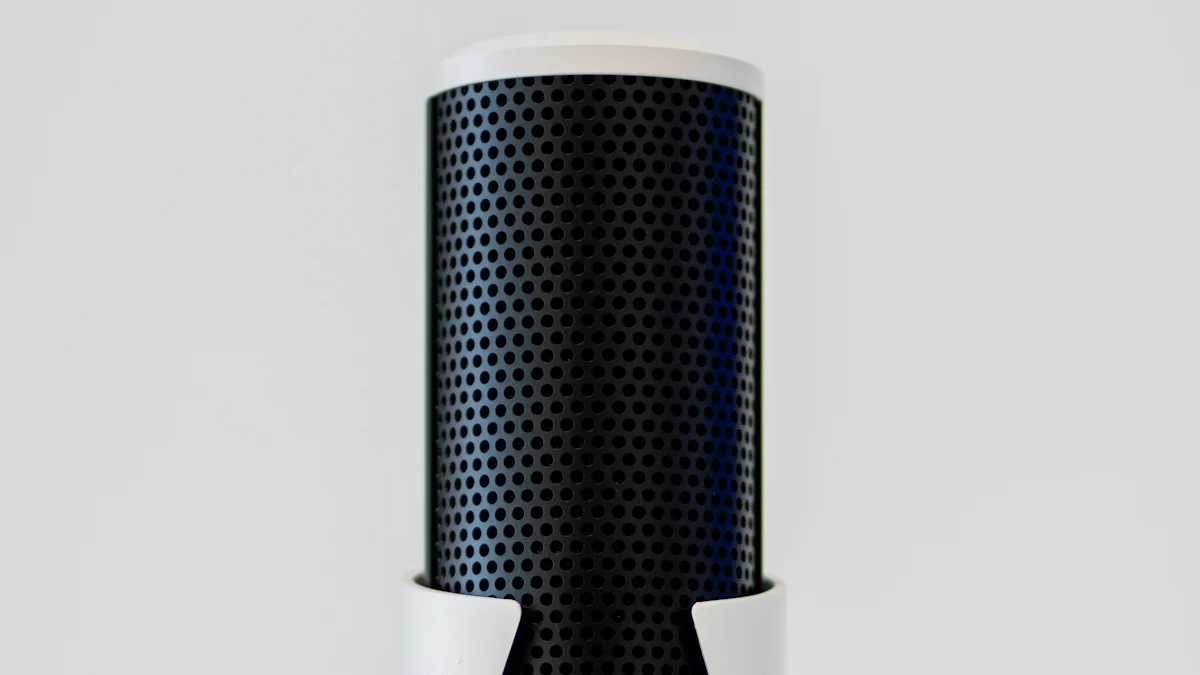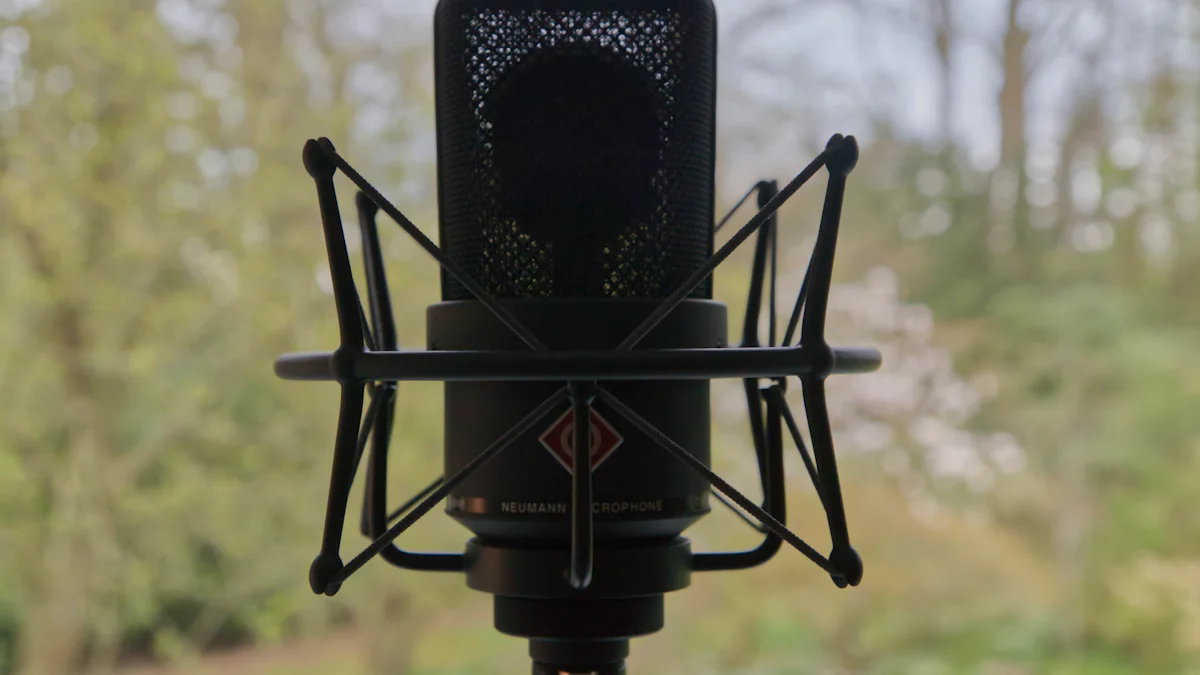Tips to Choose the Best Noise-Canceling Microphone for Travel

Traveling often places you in noisy environments like airports, trains, or bustling streets. A noise-canceling microphone becomes essential in these situations. It ensures your voice remains clear and free from distractions, whether you're on a business call, recording content, or simply enjoying leisure activities. By reducing unwanted background sounds, these microphones deliver crisp audio quality. Choosing the right one involves understanding factors like portability, compatibility, and the type of noise cancellation. Knowing how to choose the right microphone with noise cancellation for travel can significantly enhance your overall experience.
Key Takeaways
- Understand the different types of noise cancellation: Active, Passive, and Adaptive, to choose the best fit for your travel needs.
- Prioritize portability and weight when selecting a microphone; compact and lightweight designs make travel hassle-free.
- Ensure compatibility with your devices by looking for microphones that support best practices for using headset, USB, Bluetooth, and 3.5mm connections.
- Consider battery life and charging options; long-lasting batteries and USB-C compatibility enhance convenience during travel.
- Evaluate durability and build quality; choose microphones made from robust materials and consider protective cases for added security.
- Balance cost with essential features; budget-friendly options can deliver excellent performance without overspending.
- Match the microphone to your specific use case—business calls, content creation, or casual use—to ensure optimal performance.
Understanding How to Choose the Right Microphone with Noise Cancellation for Travel
Selecting the best microphone for travel requires understanding the different types of noise cancellation and their benefits.
Types of Noise Cancellation
Active Noise Cancellation (ANC)
Passive noise cancellation relies on physical barriers to block external sounds.
Passive Noise Cancellation
Passive noise cancellation relies on physical barriers to block external sounds. It uses materials like foam or padding to reduce noise without electronic components. This type of noise cancellation is effective for blocking high-frequency sounds and works best in quieter environments. Unlike ANC, passive noise cancellation doesn’t require power, making it a reliable option for those who prefer simplicity and durability.
Adaptive Noise Cancellation
Adaptive noise cancellation adjusts its performance based on the surrounding environment. It dynamically changes the level of noise reduction to match varying noise levels, such as in airports or busy streets. This feature ensures consistent audio quality, even when the noise around you fluctuates. Adaptive noise cancellation combines the benefits of ANC with added flexibility, making it a great choice for travelers who move between different settings.
Why Noise Cancellation is Essential for Travel
Reducing Ambient Noise in Busy Environments
Traveling often places you in noisy locations like airports, train stations, or bustling city streets. Noise-canceling microphones help reduce these distractions, allowing you to focus on your calls, recordings, or leisure activities. By minimizing background noise, these microphones ensure your voice remains clear and uninterrupted.
Improving Audio Clarity for Calls and Recordings
Clear audio is crucial for effective communication and high-quality recordings. Noise-canceling microphones enhance clarity by filtering out unwanted sounds, ensuring your voice stands out. Whether you’re attending a virtual meeting or recording content on the go, these microphones deliver professional-grade audio, even in challenging environments.
Key Factors to Consider When Selecting a Noise-Canceling Microphone

Choosing the right microphone for travel involves evaluating several important factors.
Portability and Weight
Compact and lightweight designs for easy travel
When traveling, carrying bulky equipment can be inconvenient. Look for microphones designed with portability in mind. Compact and lightweight models, such as the BTW Wireless Bluetooth Clip-On Omnidirectional Microphone, are perfect for travelers. This microphone easily clips onto your clothing, making it ideal for virtual meetings or audio recordings on the go. Lightweight designs reduce the strain on your luggage and allow you to move freely.
Foldable or detachable components for convenience
Microphones with foldable or detachable parts offer added convenience. These features make packing and storing your microphone hassle-free. For instance, the SYNCO G2 Pro dual microphone includes detachable components, making it a practical choice for frequent travelers. Such designs save space and protect your equipment during transit.
Battery Life and Charging Options
Long-lasting batteries for extended use
A reliable microphone should have a battery that lasts throughout your day. Long-lasting batteries are essential for extended use during travel. Models like the HyperX Quadcast provide consistent performance without frequent recharging. This ensures uninterrupted usage, whether you're attending meetings or recording content.
USB-C or rechargeable options for modern devices
Modern devices often rely on USB-C charging for faster and more efficient power delivery. Microphones with USB-C or rechargeable options, such as the RODE NT-USB Mini, are compatible with the latest gadgets. These options eliminate the need for disposable batteries, making them eco-friendly and cost-effective.
Compatibility with Devices
USB, Bluetooth, and 3.5mm jack options
Device compatibility is crucial when selecting a microphone. Ensure your microphone supports multiple connection options, such as USB, Bluetooth, or a 3.5mm jack. The Fifine K669B offers USB connectivity, making it suitable for laptops and desktops. Meanwhile, the BTW Wireless Bluetooth Clip-On Omnidirectional Microphone provides wireless Bluetooth functionality, perfect for smartphones and tablets.
Compatibility with laptops, smartphones, and tablets
Your microphone should work seamlessly with various devices. Models like the Shure MV7 are versatile and compatible with laptops, smartphones, and tablets. This flexibility allows you to switch between devices effortlessly, ensuring smooth communication and recording experiences.
Durability and Build Quality
Materials that withstand frequent travel
When traveling, your microphone faces constant handling, packing, and unpacking. Choosing a microphone made from durable materials ensures it can endure these challenges. Look for models constructed with high-quality metals or reinforced plastics. For instance, the Shure MV7 features a robust metal body, making it resistant to wear and tear. Similarly, the HyperX Quadcast combines sturdy materials with a sleek design, offering both durability and style. A well-built microphone not only lasts longer but also maintains its performance over time, even with frequent use.
Protective cases for added security
A protective case shields your microphone from accidental damage during transit. Many microphones come with custom-fit cases designed to prevent scratches, dents, or other impacts. The SYNCO G2 Pro dual microphone, for example, includes a compact case that keeps its components secure and organized. If your chosen microphone doesn’t include a case, investing in a third-party option is a wise decision. A good case ensures your microphone stays in top condition, no matter how hectic your travel schedule becomes.
Budget and Value for Money
Balancing cost with essential features
Finding the right balance between cost and features is crucial when selecting a noise-canceling microphone. You don’t need to overspend to get a high-quality product. Budget-friendly options like the Fifine K669B and Bietrun UMKF01 deliver excellent performance without breaking the bank. These models offer reliable noise cancellation and clear audio, making them ideal for travelers on a budget. Focus on essential features such as portability, compatibility, and passive noise cancellation to ensure you get the best value for your money.
Affordable options vs. premium models
Affordable microphones cater to casual users or those with basic needs, while premium models target professionals or frequent travelers. For instance, the RODE NT-USB Mini provides exceptional audio quality at a mid-range price, making it a great choice for content creators. On the other hand, the BTW Wireless Bluetooth Clip-On Omnidirectional Microphone offers affordability and ease of use, perfect for casual users. Premium models like the Shure MV7 justify their higher price with advanced features and superior build quality. Evaluate your needs and choose a microphone that aligns with your budget and travel requirements.
Comparing Popular Noise-Canceling Microphone Models

Choosing the right noise-canceling microphone depends on your specific travel needs.
Best Microphones for Business Travelers
Features like clear audio for calls and meetings
Business travelers need microphones that deliver crystal-clear audio for virtual meetings and calls. A good microphone ensures your voice remains professional and free from background noise, even in busy environments like airports or hotels. Look for models with active noise cancellation and cardioid pickup patterns, as these features focus on your voice while minimizing ambient sounds.
Examples of top-rated models
- Shure MV7: This microphone combines excellent noise-canceling capabilities with a robust build. It offers both USB and XLR connectivity, making it versatile for various devices. Its clear audio quality makes it a favorite among professionals.
- Blue Yeti Nano: Compact and portable, this microphone provides exceptional sound clarity. It features multiple pickup patterns, allowing you to adapt to different meeting setups.
- HyperX Quadcast: Known for its sleek design and superior noise reduction, this microphone is ideal for business travelers who prioritize performance and style.
Best Microphones for Content Creators
High-quality audio for podcasts and videos
Content creators require microphones that capture high-quality audio for podcasts, videos, and other media. A good microphone enhances your recordings by delivering rich, detailed sound. Look for models with features like adaptive noise cancellation and wide frequency response ranges to ensure professional-grade results.
Examples of top-rated models
- RODE NT-USB Mini: This microphone offers studio-quality sound in a compact design. Its built-in pop filter reduces unwanted noise, making it perfect for recording on the go.
- Electro-Voice RE20: A premium option for serious creators, this microphone delivers unmatched audio clarity. Its dynamic design minimizes proximity effects, ensuring consistent sound quality.
- Lewitt LCT 840: This high-end microphone provides exceptional detail and warmth, making it ideal for capturing vocals and instruments during travel.
Best Microphones for Casual Use
Affordable and easy-to-use options
Casual users need microphones that are simple, budget-friendly, and effective. These microphones should offer reliable noise-canceling features without overwhelming you with complex settings. Lightweight and portable designs are also essential for hassle-free travel.
Examples of top-rated models
- Fifine K669B: This budget-friendly microphone delivers solid performance for casual use. Its USB connectivity makes it easy to set up with laptops and desktops.
- Bietrun UMKF01: An affordable option with decent noise-canceling capabilities, this microphone is perfect for casual users who want clear audio without spending too much.
- BTW Wireless Bluetooth Clip-On Omnidirectional Microphone: This compact microphone clips onto your clothing, offering convenience and portability. Its wireless design makes it ideal for casual travelers.
Matching the Microphone to Your Travel Needs
Choosing the right microphone depends on how you plan to use it during your travels. Whether you need it for professional calls, creative projects, or casual activities, understanding your specific requirements ensures you make the best choice.
For Business Calls and Meetings
Prioritize clarity and noise reduction
When attending virtual meetings or making important calls, clear audio is essential. A microphone with excellent noise reduction ensures your voice remains the focus, even in noisy environments like airports or cafes. Models like the Shure MV7 excel in this area. Its cardioid pickup pattern isolates your voice while minimizing background noise, making it a reliable choice for business professionals. Similarly, the HyperX Quadcast offers superior noise cancellation and a sleek design, ensuring you sound professional in every conversation.
Look for models with built-in ANC
Active Noise Cancellation (ANC) enhances your communication experience by blocking out ambient sounds. The Blue Yeti Nano, with its cardioid and omnidirectional polar patterns, adapts to different environments, ensuring consistent audio quality. Its compact size and USB connectivity make it perfect for business travelers who need a dependable microphone on the go.
For Content Creation
Focus on audio quality and compatibility with recording devices
Content creators require microphones that deliver studio-quality sound. High-quality audio enhances podcasts, videos, and other creative projects. The RODE NT-USB Mini stands out for its rich sound and simple usability. Its cardioid pattern captures vocals and instruments with precision, making it ideal for recording on the move. For creators seeking premium performance, the Electro-Voice RE20 offers unmatched clarity and natural sound reproduction, ensuring your content stands out.
Consider portability for on-the-go recording
Portability is crucial for creators who record in various locations. Lightweight and compact microphones simplify travel without compromising performance. The Samson C01U Pro combines portability with professional-grade audio. Its real-time monitoring feature ensures accurate recordings, while its USB connectivity makes it easy to use with laptops and tablets. For a budget-friendly option, the Fifine K669B provides excellent sound quality in a compact design, perfect for creators on a tight budget.
For Leisure and Casual Use
Opt for budget-friendly and simple designs
Casual users often prioritize affordability and ease of use. A straightforward microphone with reliable noise-canceling features meets these needs. The Tonor ORCA-001 offers exceptional noise cancellation at a reasonable price. Its plug-and-play functionality eliminates the need for additional accessories, making it perfect for casual travelers. The BTW Wireless Bluetooth Clip-On Omnidirectional Microphone is another great option. Its wireless design and compact size make it convenient for everyday use.
Look for plug-and-play functionality
Plug-and-play microphones simplify setup, allowing you to focus on enjoying your activities. The Blue Yeti USB Microphone offers this convenience with its versatile polar patterns and easy-to-use controls. Its unique design allows you to position it on a desk or stand, making it suitable for gaming, internet calls, or casual recordings. For those who prefer a minimalist approach, the Fifine K669B delivers reliable performance without complicated configurations.
By matching your microphone to your travel needs, you can ensure a seamless experience, whether you're working, creating, or simply enjoying your journey.
Choosing the right noise-canceling microphone for travel requires careful consideration of key factors. Portability, compatibility, and durability ensure the microphone meets your needs. Matching the microphone to your specific purpose—whether for business, content creation, or casual use—guarantees the best performance. Testing microphones before purchase helps you evaluate features like better active noise cancellation and noise isolation. Reading reviews provides insights into real-world usage. Always check warranty options to protect your investment. By following these steps, you can confidently select a microphone that enhances your travel experience.
FAQ
What is the difference between active and passive noise cancellation?
Active noise cancellation uses advanced technology to reduce unwanted sounds. It works by detecting ambient noise and creating opposing sound waves to cancel it. This method is highly effective in environments with consistent background noise, such as airplanes or trains. Passive noise cancellation, on the other hand, relies on physical barriers like foam or padding to block external sounds. It doesn’t require power and works best in quieter settings.
Are noise-canceling headphones with built-in microphones suitable for travel?
Yes, noise-canceling headphones with built-in microphones are excellent for travel. They combine audio playback and voice capture in one device, making them convenient for calls, recordings, or leisure activities. These headphones often feature active noise cancellation, which ensures clear communication even in noisy environments like airports or train stations.
How do I know if a microphone is compatible with my devices?
Check the connection options of the microphone. Most models support USB, Bluetooth, or 3.5mm jacks. Ensure your device has the corresponding port or wireless capability. Some microphones, like the Shure MV7, offer multiple connectivity options, making them versatile for laptops, smartphones, and tablets.
Can I use a noise-canceling microphone for both business and casual purposes?
Absolutely. Many microphones are designed to cater to various needs. For business, models like the HyperX Quadcast provide clear audio for calls and meetings. For casual use, budget-friendly options like the Fifine K669B deliver reliable performance without overwhelming features. Choose a microphone that matches your primary purpose but remains flexible for other uses.
Do all noise-canceling microphones require batteries?
Not all noise-canceling microphones require batteries. Active noise-canceling models often need power, either through rechargeable batteries or USB connections. Passive noise-canceling microphones don’t rely on power, as they use physical materials to block noise. Consider your travel habits to decide which type suits you best.
What makes adaptive noise cancellation different from active noise cancellation?
Adaptive noise cancellation adjusts its performance based on the surrounding environment. It dynamically changes the level of noise reduction to match varying noise levels, such as in busy streets or quiet cafes. Active noise cancellation, however, maintains a consistent level of noise reduction regardless of changes in the environment.
Are lightweight microphones durable enough for frequent travel?
Yes, many lightweight microphones are built with durable materials to withstand frequent travel. Models like the SYNCO G2 Pro feature sturdy construction and protective cases to ensure longevity. Always check the build quality and consider investing in a protective case for added security during transit.
How do I maintain the performance of my noise-canceling microphone?
Proper maintenance ensures your microphone performs well over time. Store it in a protective case when not in use. Clean it regularly to remove dust or debris. Avoid exposing it to extreme temperatures or moisture. Following these steps will help extend the life of your microphone.
Can noise-canceling headphones replace standalone microphones?
Noise-canceling headphones can replace standalone microphones for casual use or basic communication needs. However, standalone microphones often provide superior audio quality and advanced features, making them better suited for professional calls, content creation, or high-quality recordings.
What should I prioritize when choosing a microphone for travel?
Focus on portability, compatibility, and noise cancellation type. Lightweight designs with foldable components make travel easier. Ensure the microphone works with your devices and offers active or adaptive noise cancellation for noisy environments. Balancing these factors with your budget will help you find the perfect microphone for your needs.
See Also
Selecting The Ideal Webcam For Huddle Room Meetings
Finding The Right 360-Degree Camera For Your Conference Space
Discovering The Best Video Conferencing Camera For Meetings
